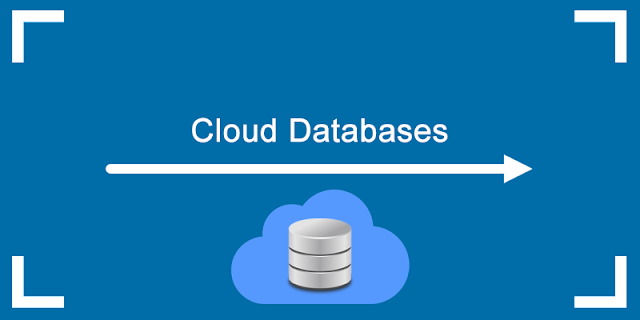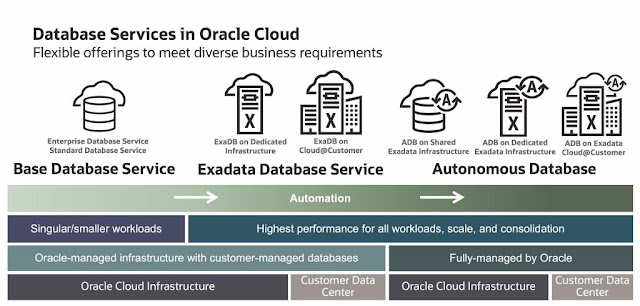Visited the database page on Oracle.com lately? If so, you may have noticed a few new cloud database services, and missed a few familiar names belonging to our most popular and powerful services. What’s going on?
Don’t worry, we haven’t abandoned your favorite cloud database services. Rather, we’ve renamed these services to better reflect our overall portfolio of services, making it easier to see where they are the same, and where they are different.
Oracle offers three cloud database service families that are 100% compatible with the industry leading Oracle Database:
◉ Oracle Autonomous Database
◉ Oracle Exadata Database Service
◉ Oracle Base Database Service
Each family provides a suite of cloud database services with different capabilities, deployment options, and price points. These services give you the freedom to choose the best database service to meet your specific needs, whether it’s features, SLAs, or even data residency requirements.
Let’s take a closer look at these three database service families, how they relate to each other, and how they map to the old familiar services.
Oracle Autonomous Database
Autonomous Database is the simplest cloud database service for running any application, at any scale or criticality. It uses machine learning driven automation to eliminate human labor, human error, and manual tuning, thereby reducing deployment costs and administrative complexities while ensuring the highest reliability, security, and operational efficiency.
Autonomous Database Shared is only available in the public cloud in Oracle Cloud Infrastructure (OCI), whereas Autonomous Database Dedicated provides a choice to deploy on-premises or in the public cloud. You can free yourself from managing data centers and the database itself by running Autonomous Database in OCI. Those with data residency requirements or other complexities that prevent moving databases to the public cloud can deploy on Exadata Cloud@Customer, giving you all the benefits of Autonomous Database with all your data securely located behind your firewall in your data center.
| Service Name | Description |
| Autonomous Database Shared | Autonomous Database running in a PDB in a shared container database in the public cloud (OCI) |
| Autonomous Database on Dedicated Exadata Infrastructure | Autonomous Database running on dedicated Exadata Infrastructure in the public cloud (OCI) |
| Autonomous Database on Exadata Cloud@Customer | Autonomous Database running on Exadata Cloud@Customer in your data center |
Oracle Exadata Database Service
Looking for a bit more control, and willing to put in a little more effort in exchange for that control? Exadata Database Service provides all the power of Oracle Database running as a cloud database service on the Exadata platform. What differentiates this service from Autonomous Database is that you, not Oracle, manage the virtual machines (VMs) and databases, allowing you to customize your environment with root access to the VMs. You can install software agents, patches specific to your environment, and fully control database versions and release updates. You also have complete control over access to the VMs, providing secure isolation for the databases you manage. Oracle experts manage the underlying compute and storage infrastructure, and powerful automation you control simplifies managing the VMs and databases.
Exadata Database Service also provides a choice of deployment models. As with Autonomous Database Dedicated, you can run the service on dedicated servers in the public cloud in OCI, or in your own data center on Exadata Cloud@Customer. With Exadata Cloud@Customer a single system can run both Exadata Database Service and Autonomous Database, making it easy to share that investment across both services. Exadata Database Service has been available since 2016, but under different names depending on the deployment model, either public cloud or cloud@customer.
| Service Name | Old Service Name | Description |
| Exadata Database Service on Dedicated Infrastructure | Exadata Cloud Service | Exadata Database Service running in the public cloud(OCI) |
| Exadata Database Service on Cloud@Customer | Exadata Cloud@Customer | Exadata Database Service running on Exadata Cloud@Customer in your data center |
Oracle Base Database Service
What about those workloads that don’t need the power of Exadata, but where you still require control over the virtual machine and database? For these workloads, we offer Base Database Service in VMs on standard compute servers with network-attached block storage. The cloud infrastructure is still managed by Oracle and you still get the control (root access) and benefits of cloud automation for deployment, maintenance, backup, and disaster protection. Base Database Service starts with as little as 1 OCPU and offers a variety of feature levels/price points including Enterprise Database Service and Standard Database Service. 2-node RAC is also available as an option for those who require high-availability.
Base Database Service is deployed in the public cloud (OCI) and supports a wide variety of feature levels and corresponding price points.
| Service Name | Old Service Name | Description |
| Oracle Enterprise Database Service | Database Cloud Service (DBCS) Virtual Machine | Base Database Service running Oracle Database Enterprise Edition |
| Oracle Standard Database Service | Database Cloud Service (DBCS) Virtual Machine | Base Database Service running Oracle Database Standard Edition 2 |
And, to give you a bit more control over the pricing and feature set, Oracle Enterprise Database Service comes in three different feature levels:
◉ Oracle Enterprise Database Service: Includes the features of Oracle Enterprise Database, plus Real Application Testing, Data Masking and Subsetting Pack, Tuning Pack and Diagnostics Pack
◉ Oracle Enterprise Database Service—high performance: Includes all the features of Oracle Enterprise Database Service plus Partitioning, Advanced Compression, Advanced Security, Multitenant, OLAP, Label Security, Database Vault, Cloud Management Pack and Lifecycle Management Pack
◉ Oracle Enterprise Database Service—extreme performance: Includes all the features of Enterprise Database Service—high performance plus Real Application Clusters, Active Data Guard and Database In-Memory
All the services include Transparent Data Encryption. Bring your own license (BYOL) is also available in case you want to use existing Oracle Database licenses when you migrate to one of the cloud database services.
What to Choose?
While you are probably excited by all these options, you just want to deploy your database in the cloud—which service is best for you?
The first consideration is where you want to run your database services. Can you run in OCI, or must you run inside your data center? This is likely driven by data residency requirements and the need to integrate with on-premises applications. If you have a choice, we always recommend deploying in OCI to save yourself the cost of managing data centers. With OCI you have your choice of any database service. If you need to run your databases inside your data center, Exadata Cloud@Customer is a popular deployment option that supports Exadata Database Service and Autonomous Database Dedicated. Dedicated Region Cloud@Customer (DRCC) provides you your own cloud region and also supports any database service.
Now, let’s take a close look at the services. We recommend always starting with Autonomous Database. The best way to gain value from your IT investments is to focus your energy on enhancing your business and informational insights. Autonomous Database eliminates infrastructure and database management, freeing you to invest in your business, not in maintenance, backups, high availability features, disaster protection, performance tuning, and security of your databases. That’s all taken care of for you automatically with Autonomous Database. If running in OCI or DRCC, you can also choose between Autonomous Database Shared and Dedicated deployments. It’s simple to get started with a shared deployment, but dedicated deployments provide better isolation as well as control over the timing of underlying maintenance activities.
If you or your application is not ready for Autonomous Database, perhaps because you just want to lift and shift to cloud, need to install your own software agents, or you want to run legacy applications, you can choose between Exadata Database Service or Base Database Service. To gain the most value, start with Exadata Database Service, and look to reduce your TCO through consolidation. Consolidation with Exadata Database Service can reduce costs dramatically, while leveraging the power of Exadata to improve performance, security, online scalability, and availability. However, if you are running in OCI or DRCC and have a singular or smaller workload that won’t benefit from Exadata, Base Database Service is an attractive option and still provides good performance while balancing cost.
Oracle strives to provide the best options for deploying databases. We recognize one size does not fit all and offer a complete portfolio of cloud database services to meet your specific requirements. From Autonomous Database to Exadata Database Service to Base Database Service, you can choose from a wide variety of feature sets, with different levels of automation and customization. All provide the core benefits of deploying in the cloud—cloud infrastructure management, cloud automation, and cloud economics. And, all are 100% compatible with the Oracle Database, giving you the confidence to adopt the cloud with minimal investment and no cloud vendor lock-in.
Source: oracle.com





0 comments:
Post a Comment